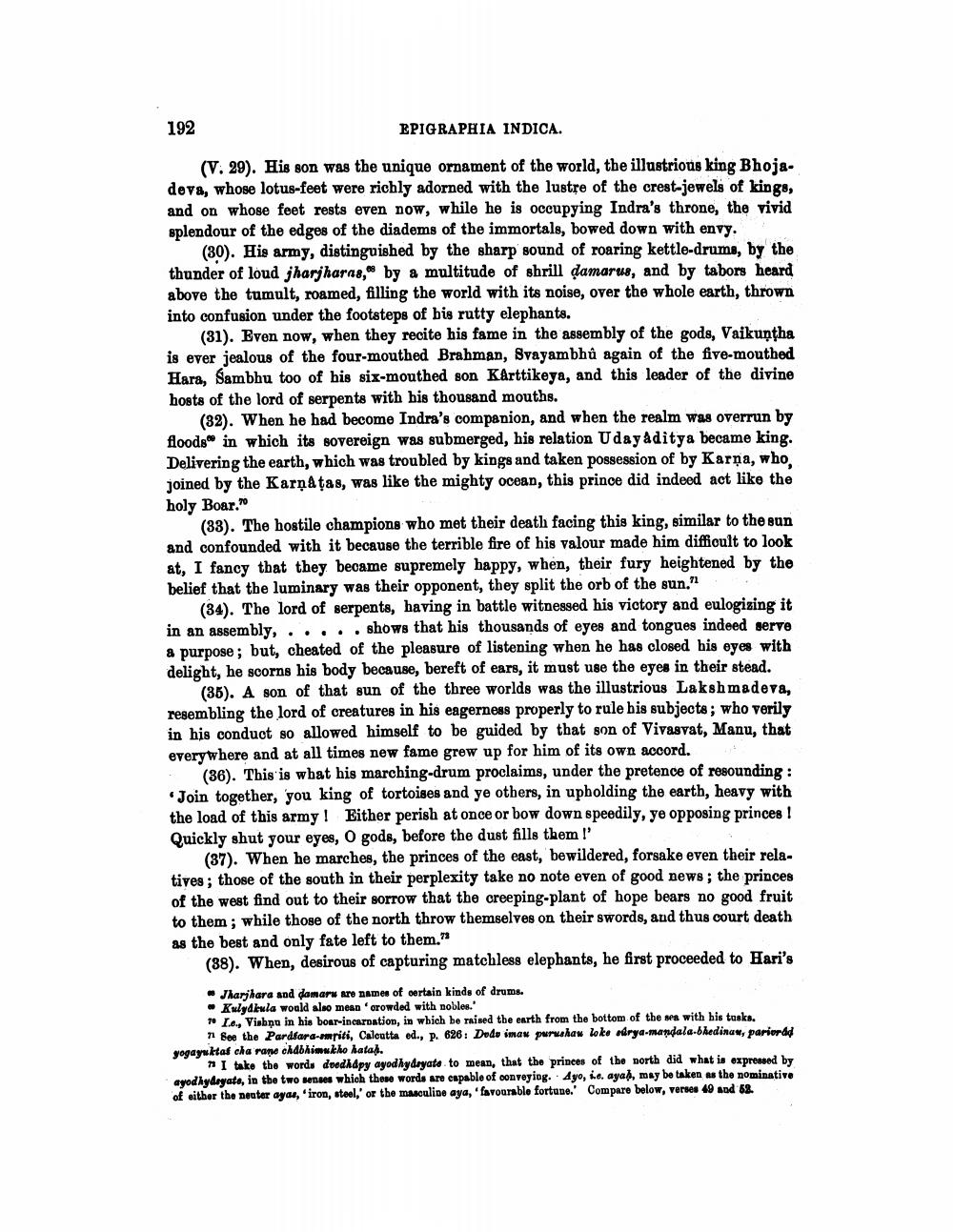________________
192
EPIGRAPHIA INDICA.
(V. 29). His son was the unique ornament of the world, the illustrious king Bhojadeva, whose lotus-feet were richly adorned with the lustre of the crest-jewels of kings, and on whose feet rests even now, while he is occupying Indra's throne, the vivid splendour of the edges of the diadems of the immortals, bowed down with envy.
(30). His army, distinguished by the sharp sound of roaring kettle-drums, by the thunder of loud jharjharas, by a multitude of shrill damarus, and by tabors heard above the tumult, roamed, filling the world with its noise, over the whole earth, thrown into confusion under the footsteps of bis rutty elephants.
(31). Even now, when they recite his fame in the assembly of the gods, Vaikuntha is ever jealous of the four-mouthed Brahman, Svayambhú again of the five-mouthed Hara, Sambhu too of his six-mouthed son Karttikeya, and this leader of the divine hosts of the lord of serpents with his thousand mouths.
(32). When he had become Indra's companion, and when the realm was overrun by floods in which its sovereign was submerged, his relation Udayaditya became king. Delivering the earth, which was troubled by kings and taken possession of by Karņa, who, joined by the Karnațas, was like the mighty ocean, this prince did indeed act like the holy Boar.
(33). The hostile champions who met their death facing this king, similar to the sun and confounded with it because the terrible fire of his valour made him difficult to look at, I fancy that they became supremely happy, when, their fury heightened by the belief that the luminary was their opponent, they split the orb of the sun."
(34). The lord of serpents, having in battle witnessed his victory and eulogizing it in an assembly, ..... shows that his thousands of eyes and tongues indeed serve & purpose; but, cheated of the pleasure of listening when he has closed his eyes with delight, he scorns his body because, bereft of ears, it must use the eyes in their stead.
(35). A son of that sun of the three worlds was the illustrious Lakshmadera, resembling the lord of creatures in his eagerness properly to rule bis subjects; who verily in his conduct so allowed himself to be guided by that son of Vivasvat, Manu, that everywhere and at all times new fame grew up for him of its own accord.
(36). This is wbat his marching-drum proclaims, under the pretence of resounding : Join together, you king of tortoises and ye others, in upholding the earth, heavy with the load of this army! Either perish at once or bow down speedily, ye opposing princes ! Quickly shut your eyes, O gods, before the dust fills them !
(37). When he marches, the princes of the east, bewildered, forsake even their rela. tives: those of the south in their perplexity take no note even of good news; the princes of the west find out to their sorrow that the creeping-plant of hope bears no good fruit to them; while those of the north throw themselves on their swords, and thus court death as the best and only fate left to them."
(88). When, desirous of capturing matchless elephants, he first proceeded to Hari's
Jharjhara and damaru are names of certain kinds of drums.
Kulydkula would also mean orowded with nobles.' 1 Lo, Visbņu in his boar-incarnation, in which be raised the earth from the bottom of the sea with his tasks.
71 See the Pardfara-umiti, Calcutta ed., p. 626: Dodo inau purushaw loke edrya-mandala-bedings, parierdd yogayuktaf cha rano chdbhimukho hatal.
I take the words doodhdpy ayodhydryata to mean, that the princes of the north did what is expressed by ayodhydoyato, in the two sonses which these words are capable of convoying. Ayo, 1o. ayah, may be taken as the nominative of either the neuter ayaa, 'iron, steel,' or the masculine aya, 'favourable fortune. Compare below, verses 49 and 52




